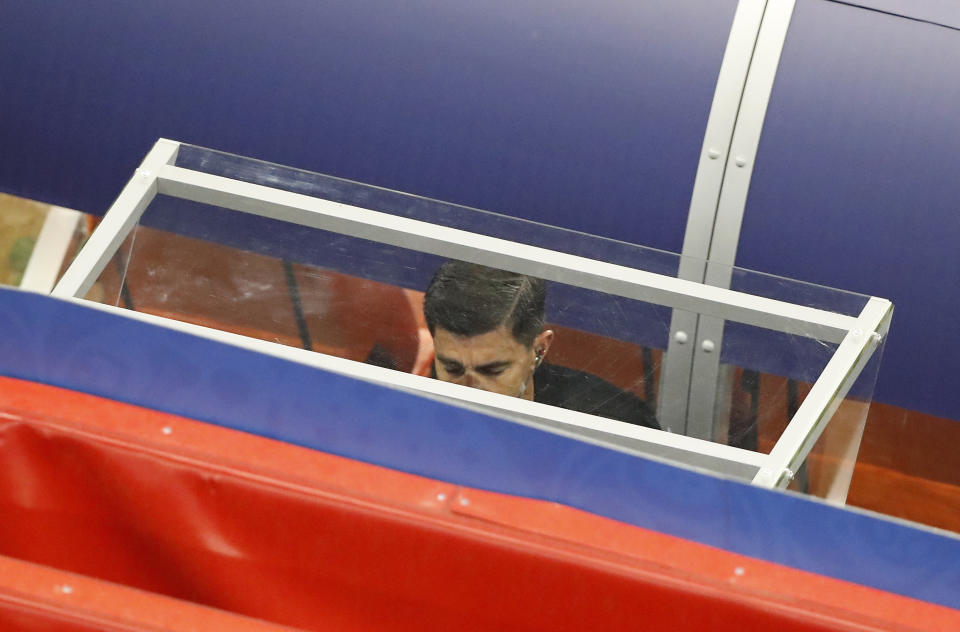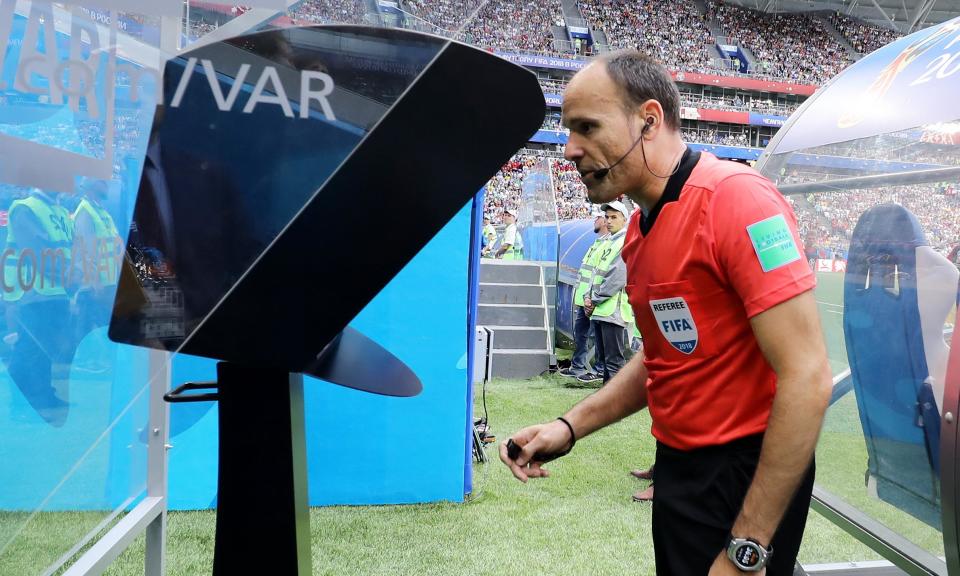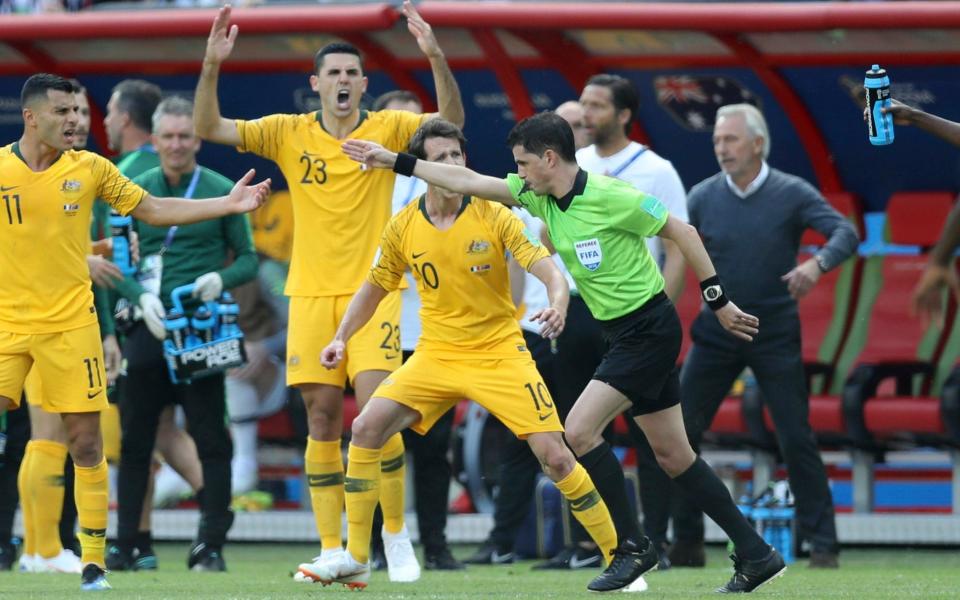Exclusive: VAR expert questions FIFA’s use of World Cup as ‘test case’

VAR has made plenty of correct decisions but has also caused controversy at the World Cup
Once again, VAR has been in the eye of the storm at World Cup 2018.
What constitutes a ‘clear and obvious error’ still appears to be causing confusion, and not just in the stands.
Moroccan star Nordin Amrabat mouthed ‘VAR, it’s b*llsh*t’ after their draw with Spain last night, while Alan Shearer went on a rant after the Portugal v Iran game and labelled it b*ll*cks on social media.
And the officials themselves have come under heavy scrutiny for their decision making, but that’s no surprise according to Paul Rejer of The Ref Online, the first VAR manager in the world.
Paul was involved at the genesis of the idea back in 2014 when working for PRO (Professional Referees Organisation) based in the New York offices of MLS, and he believes more work should have been done before the full-time introduction of the ‘finished product.’
READ MORE: Explained: How VAR will work at the World Cup
READ MORE: The 32 – Poor referees and not VAR the problem, believes Bassett
READ MORE: Iran boss slams FIFA over Ronaldo’s VAR escape
“They used to call it Real Time Video Review,” Paul noted. “At the start of 2016, we simply got the referees together and tried to get some sort of protocol for the language used. It was very basic, but we had two years of training before introducing it in games.
“The problem now is that referees are just being thrown into it.”
The rush to get the technology out and working, at seemingly any cost, could have catastrophic consequences, but with other sports being tech-savvy for some while now, the powers that be at FIFA have decided, in their wisdom, that a World Cup was the perfect scenario within which to trial the product.
“To use the World Cup as some sort of test case is very dangerous,” Rejer added.
“Apart from the American referees at the tournament plus maybe a handful of others who’ve had solid training in this, the other referees don’t appear to know too much about VAR. The only training they would’ve had is when FIFA and IFAB (International Football Association Board) got together prior to the World Cup – which is more or less a crash course.”
It’s fairly clear that a lack of nous has hindered the officials when it comes to defining what constitutes invoking the VAR in the first place.
Rejer noted the IFAB’s guidelines on the matter. “It’s when almost everyone, whether they’re a neutral, player, coach, spectator or administrator agrees that the decision is incorrect. That the decision is not debatable.”
READ MORE: Shearer: VAR is ‘b*****ks’ and it’s causing chaos
READ MORE: The 32: Rob Lee on the most annoying part of VAR at the World Cup
READ MORE: Schmeichel and Eriksen’s VAR fury
When working through the issues in the early days, it was quickly agreed that 95% of people in the room had to agree that a decision was incorrect, something that has followed through to the present day. Is that happening in Russia? Absolutely not.
“We’ve seen instances where the VAR should’ve got involved and he hasn’t, eg the Harry Kane penalty decision, and then VAR has got involved when the decision isn’t clearly incorrect – like the penalty decision between Iran and Portugal,” Rejer said.
“In fact, almost everyone would say it was never a handball in the first place. The VAR should never have got involved in that particular situation because it wasn’t a clear and obvious error. Secondly, it beggars belief that the referee looked at the screen and then decided to give a penalty.”

As things began to turn nasty in the Iran-Portugal match, Cristiano Ronaldo appeared to strike his opponent with an elbow. The VAR was again invoked and though some commentators would later suggest the ref ‘bottled’ the decision to send the Portuguese off, Rejer believes the officials got that one right.
“I don’t think that’s a clear and obvious error because I looked at it and was thinking ‘does he actually contact him on the face, is it a strike or is it just brushing him off’… it was clearly a yellow card offence. it was not clear either way.”
Had Ronaldo been sent off, there is an appeals process, but that differs from each competition or league making understanding the VAR ever more confusing.
READ MORE: Struggling Spain need Hierro steel to keep World Cup hopes alive
READ MORE: Uruguay ‘put the brakes on’ as Tabarez calms ‘world champion’ talk
READ MORE: Portugal dream just about alive as sleep-deprived Ronaldo flops
Two other instances that haven’t yet occurred but that could also muddy the waters involve potential penalty decisions that require a review by the VAR.
For example, what would happen if play continues and a goal is scored at the other end, but then the VAR is invoked? Similarly, play continues but a player is shown a red card for a challenge or violent conduct, and then VAR is required for the prior penalty decision?
“If there’s a penalty decision down one end, play breaks away and the other team score, and it’s then decided that it should’ve been a penalty in the first place, the goal is ruled out,” Rejer advised.

“If a player commits serious foul play then he is still sent off or he has committed an act of violent conduct regardless.
“But, let’s say there should’ve been a penalty down the one end, there’s a breakaway to the other end and there’s a DOGSO (Denying Obvious Goal Scoring Opportunity) situation, like a shirt pull or a trip but not violent conduct… play is brought back by the VAR for the original penalty decision, and in that instance only, the red card would not stand.”
It’s worth stressing also that there is no time limit for the VAR when making his referral. As long as the decision is the correct one, then he/she may take as long as they wish before drawing the referees attention to a particular situation.

In any event, here we are, almost two weeks into the world’s showpiece football tournament, and there is still so much work that needs to be done.
The clarity needed for everyone; players, managers, supporters and most importantly the officials themselves, patently isn’t there.
Another own goal from FIFA.

 Yahoo Sport
Yahoo Sport 





































